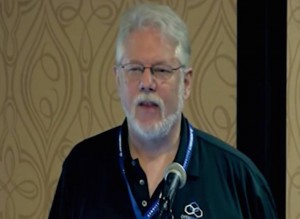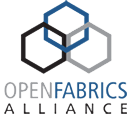
Paul Grun, OpenFabrics Alliance Vice Chairman
In this special guest feature, Paul Grun, OpenFabrics Alliance Vice Chairman describes why your participation is needed for the upcoming Open Fabrics Workshop. The event takes place March 27-31 in Austin.
Each year the OpenFabrics Alliance (OFA) hosts an annual workshop devoted to advancing the state of the art in networking. Those who have been to the workshop will attest to its role as a premier event; if you’ve never been, the workshop is known for airing a broad range of topics all related to networking technology and deployment.
One secret to the enduring success of the workshop is the OFA’s emphasis on hosting an interactive, community-driven event. To continue that trend, we are once again reaching out to the community to create a rich program that addresses topics important to the networking industry. We’re looking for proposals for workshop sessions.
As a start, this year’s Technical Program Committee has suggested a list of topics that are likely to draw the attention of workshop attendees.
- RDMA in Commercial Environments – application performance in the commercial sector is increasingly dependent on network performance; this is driving adoption of RDMA-based networks. This is especially true in sectors like oil and gas, financial services, automotive, life sciences and a host of others.
- Distributed Applications and Services – large scale distributed computing carries with it some unique challenges; the solutions to those challenges often lead to major breakthroughs in network technology.
- Data Intensive Computing and Analytics – data intensive systems place unique demands on networks. Must networks evolve to continue to meet those demands?
- Communications Middleware – this topic is a deeper dive into the software layers on which compute, analytics and storage depend.
- Network APIs, Libraries and Software – the bread and butter of the OFA’s work, this is where the rubber meets the road.
- Persistent Memory – aka non-volatile memory. It’s clear that persistent memory is upending the way we think about the memory/storage hierarchy and how computing systems are built.
- RDMA in the Kernel – RDMA has become a mainstream technology; its continued movement upstream into the kernel is the proof in the pudding. But that movement is not without some growing pains.
- Accelerators, FPGAs and GPUs – large systems are clearly moving beyond the bounds of traditional compute engines, and networks must keep up with the challenge.
- Deploying RDMA – for all those who are building and deploying real systems to do real work, this topic is for you.
- Management, Monitoring and Configuration – the nuts and bolts of configuring and managing a system that includes RDMA technologies.
- New and Advanced Network Technologies – an opportunity to peer around the bend to see what’s coming our way.
- Future Directions in Networking – nothing ever stands still! What do we, as a community, want to see the OFA become as it evolves with the times? How do we get it there?
 It’s a pretty long list, but it’s just a starting point. As they say, “But that’s not all!” If you have a topic related to networking which doesn’t fit neatly into one of these areas, submit it anyway and we’ll find a place for it.
It’s a pretty long list, but it’s just a starting point. As they say, “But that’s not all!” If you have a topic related to networking which doesn’t fit neatly into one of these areas, submit it anyway and we’ll find a place for it.
Submitting a proposal is easy, go to the OFA Workshop 2017 Call for Sessions page where you’ll find simple instructions. All that’s really required is a paragraph or two describing the session you are proposing. Your proposal could be for a half hour talk, a Birds of a Feather session, a panel, or even for a “Town Hall” style discussion.
So who are ‘you’? You are anybody who depends on networks in any way, shape or form. You are network architects and designers, you are software developers writing networking stacks, you are application developers and middleware designers who rely on networks. You are also datacenter managers and those responsible for keeping systems running. The systems you manage include compute complexes, analytics systems, storage and storage networks, cloud deployments, virtualized systems and a host of other environments that rely on networks.
Be sure to watch the OFA Workshop 2017 page for more details. See you all in Austin in March!




